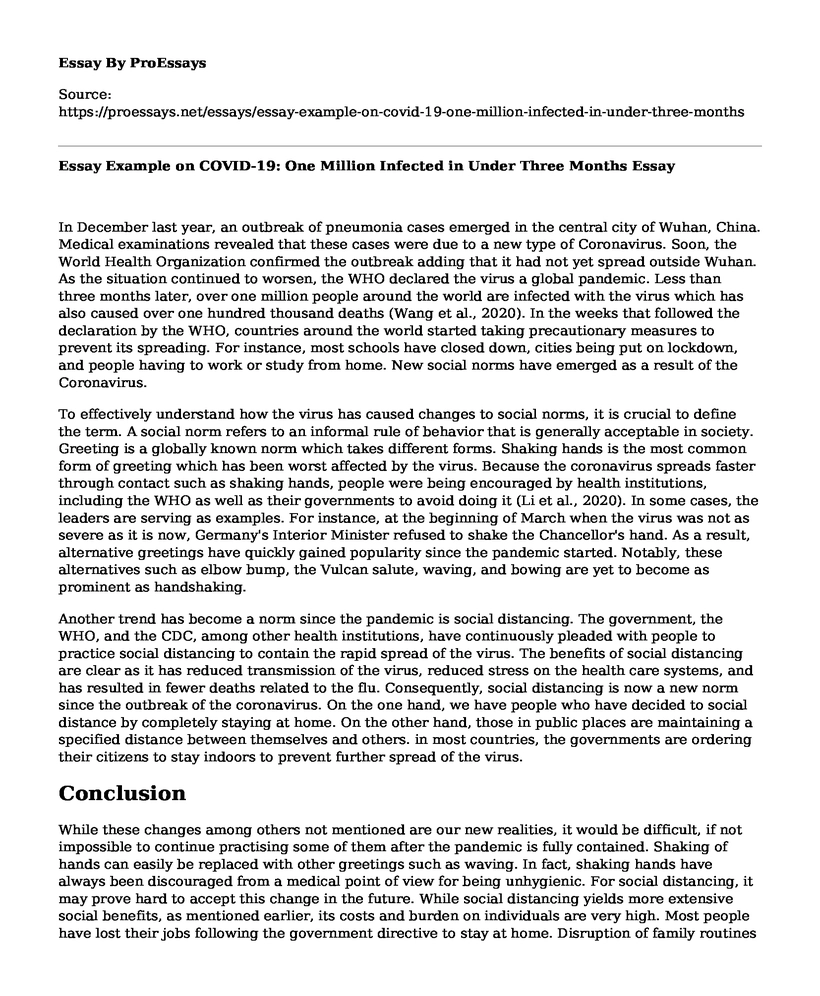In December last year, an outbreak of pneumonia cases emerged in the central city of Wuhan, China. Medical examinations revealed that these cases were due to a new type of Coronavirus. Soon, the World Health Organization confirmed the outbreak adding that it had not yet spread outside Wuhan. As the situation continued to worsen, the WHO declared the virus a global pandemic. Less than three months later, over one million people around the world are infected with the virus which has also caused over one hundred thousand deaths (Wang et al., 2020). In the weeks that followed the declaration by the WHO, countries around the world started taking precautionary measures to prevent its spreading. For instance, most schools have closed down, cities being put on lockdown, and people having to work or study from home. New social norms have emerged as a result of the Coronavirus.
To effectively understand how the virus has caused changes to social norms, it is crucial to define the term. A social norm refers to an informal rule of behavior that is generally acceptable in society. Greeting is a globally known norm which takes different forms. Shaking hands is the most common form of greeting which has been worst affected by the virus. Because the coronavirus spreads faster through contact such as shaking hands, people were being encouraged by health institutions, including the WHO as well as their governments to avoid doing it (Li et al., 2020). In some cases, the leaders are serving as examples. For instance, at the beginning of March when the virus was not as severe as it is now, Germany's Interior Minister refused to shake the Chancellor's hand. As a result, alternative greetings have quickly gained popularity since the pandemic started. Notably, these alternatives such as elbow bump, the Vulcan salute, waving, and bowing are yet to become as prominent as handshaking.
Another trend has become a norm since the pandemic is social distancing. The government, the WHO, and the CDC, among other health institutions, have continuously pleaded with people to practice social distancing to contain the rapid spread of the virus. The benefits of social distancing are clear as it has reduced transmission of the virus, reduced stress on the health care systems, and has resulted in fewer deaths related to the flu. Consequently, social distancing is now a new norm since the outbreak of the coronavirus. On the one hand, we have people who have decided to social distance by completely staying at home. On the other hand, those in public places are maintaining a specified distance between themselves and others. in most countries, the governments are ordering their citizens to stay indoors to prevent further spread of the virus.
Conclusion
While these changes among others not mentioned are our new realities, it would be difficult, if not impossible to continue practising some of them after the pandemic is fully contained. Shaking of hands can easily be replaced with other greetings such as waving. In fact, shaking hands have always been discouraged from a medical point of view for being unhygienic. For social distancing, it may prove hard to accept this change in the future. While social distancing yields more extensive social benefits, as mentioned earlier, its costs and burden on individuals are very high. Most people have lost their jobs following the government directive to stay at home. Disruption of family routines and the loneliness that comes with completely staying at home are some of the individual costs of social distancing. Nonetheless, it is important to accept these preventive measures like our new norms so that medical professionals can fight and contain the virus. Following these precautions will ensure we get back to our normal lives sooner.
References
Li, Q., Guan, X., Wu, P., Wang, X., Zhou, L., Tong, Y., & Xing, X. (2020). Early transmission dynamics in Wuhan, China, of novel coronavirus-infected pneumonia. New England Journal of Medicine. https://www.nejm.org/doi/full/10.1056/NEJMoa2001316
Wang, C., Horby, P. W., Hayden, F. G., & Gao, G. F. (2020). A novel coronavirus outbreak of global health concern. The Lancet, 395(10223), 470-473. https://www.thelancet.com/journals/lancet/article/PIIS0140-6736(20)30185-9/fulltext
Cite this page
Essay Example on COVID-19: One Million Infected in Under Three Months. (2023, May 17). Retrieved from https://proessays.net/essays/essay-example-on-covid-19-one-million-infected-in-under-three-months
If you are the original author of this essay and no longer wish to have it published on the ProEssays website, please click below to request its removal:
- Social Determinants of Health, Poverty and Christian Views Essay
- Essay Example on Surgical Technologists: Unsung Heroes of Healthcare
- Essay on Musculoskeletal Disorders of the Extremities: A Physical Examination Experience
- Essay Sample on Digital Health Records: EMRs & EHRs - Improving Patient Care
- Essay on Encouraging Behavior Change in Type 2 Diabetes Patients Through Shared Phone-Calls
- Exploring Identity in Carmen Rivera's Play 'La Gringa': The Journey of Maria Elen - Essay Sample
- Essay Sample on Unethical Prison Experiment: Review of Zimbardo's Application for Approval







